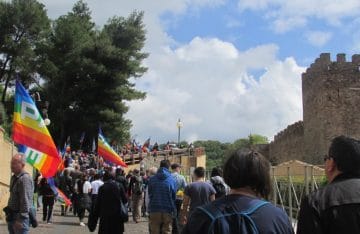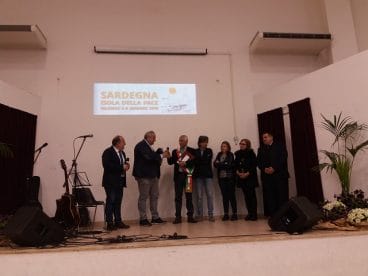 Sulcis-Iglesiente is an historical region of Sardinia, characterized not only by its impressive natural beauty, but also for the story of the mine workers: a human, spiritual, cultural and environmental patrimony. It is a unique jewel in the world, which has not yet expressed its full potential, also from the economical point of view. On March 3, 2017, a conference on disarmament was held in Calgriari organized by the Domenico Mangano Scuola di Partecipazione Politica. Several residents from Sulcis-Iglesiente were directly involved, since the headquarters of the RWM Italia is controlled by the Rheinmetall bomb factory, which sells bombs to Saudi Arabia and utilized for the war in Yemen. When this became known, a committee was formed one year ago, joining the forces for a common objective: reconverting the military factory into a civilian operation. This is the Comitato riconversione RWM for peace, a sustainable project, the reconversion of a war industry, disamament, public sharing in the reconversion process and the protection of the natural environmental and social patrimony of Sulcis-Iglesiente.”
Sulcis-Iglesiente is an historical region of Sardinia, characterized not only by its impressive natural beauty, but also for the story of the mine workers: a human, spiritual, cultural and environmental patrimony. It is a unique jewel in the world, which has not yet expressed its full potential, also from the economical point of view. On March 3, 2017, a conference on disarmament was held in Calgriari organized by the Domenico Mangano Scuola di Partecipazione Politica. Several residents from Sulcis-Iglesiente were directly involved, since the headquarters of the RWM Italia is controlled by the Rheinmetall bomb factory, which sells bombs to Saudi Arabia and utilized for the war in Yemen. When this became known, a committee was formed one year ago, joining the forces for a common objective: reconverting the military factory into a civilian operation. This is the Comitato riconversione RWM for peace, a sustainable project, the reconversion of a war industry, disamament, public sharing in the reconversion process and the protection of the natural environmental and social patrimony of Sulcis-Iglesiente.” ![]() Cinzia Guaita from the Focolare Movement is one of the promoters of the project. She reports: “The work of the committee is not easy, because Sulcis-Iglesiante is a region where jobs are scarce and, the jobs that do exist are defended with pitchforks and shovels. It isn’t easy to insert a process that would bring about a change in thinking and doing things differently, which might turn out to be more risky.” “We’re a very close-knit and diverse network. Before, nobody talked about it. Now, the ethical, environmental and legal questions are widespread. There has been one cultural result, although it is a long-term process.” Where can the greatest change be seen? “Let’s take the topic of work: before, we coudn’t discuss it; whereas, now, along with work there are other topics like peace, justice – and that’s no small matter for such a poor region as ours.” You talk about confronting, but you all stress dialogue… “That’s true, we’re dialoging and we do that with everyone, because this is a problem that regards everyone and it can be resolved by looking at the problem from different points of view. Let me give you an example: We opened a table for a technical discussion with experts, to study a reconversion plan. There were technicians, university experts and others like Banca Etica, Protestant Church: The committee is a sort of laboratory, non-conclusive, the beginning of a concrete process.”
Cinzia Guaita from the Focolare Movement is one of the promoters of the project. She reports: “The work of the committee is not easy, because Sulcis-Iglesiante is a region where jobs are scarce and, the jobs that do exist are defended with pitchforks and shovels. It isn’t easy to insert a process that would bring about a change in thinking and doing things differently, which might turn out to be more risky.” “We’re a very close-knit and diverse network. Before, nobody talked about it. Now, the ethical, environmental and legal questions are widespread. There has been one cultural result, although it is a long-term process.” Where can the greatest change be seen? “Let’s take the topic of work: before, we coudn’t discuss it; whereas, now, along with work there are other topics like peace, justice – and that’s no small matter for such a poor region as ours.” You talk about confronting, but you all stress dialogue… “That’s true, we’re dialoging and we do that with everyone, because this is a problem that regards everyone and it can be resolved by looking at the problem from different points of view. Let me give you an example: We opened a table for a technical discussion with experts, to study a reconversion plan. There were technicians, university experts and others like Banca Etica, Protestant Church: The committee is a sort of laboratory, non-conclusive, the beginning of a concrete process.”  How is the RWM factory seen in the territory? “The factory has been inserted with a lot of benevolence in the local social dynamic, although it violates a national law that forbids the sale of arms to countries at war, or that doesn’t respect human rights; but it also provides for the possiblity receiving funds for the reconversion of factories that produce arms. So, the possiblities are there. Reconversion doesn’t mean taking a leap in the dark; it’s a shared growing process and an improvement in the life of everyone. What role has the press played in all this? “A very decisive role I would say, and we ourselves are amazed that the international press has shown interest. German television is watching us and has reported in Germany what is happening here. There is much silence about the wars, such as the wars in Yemen. Turning the spotlight on those conflicts has brought the problems of such places to the attention of the world. If we want to build peace, we can’t close our eyes. Everyone is needed if we want small local efforts to be broadcasted more widely. This is what loving a local territory means. It may be risky, but it’s worth the risk when it comes to peace.” Source: United World Project
How is the RWM factory seen in the territory? “The factory has been inserted with a lot of benevolence in the local social dynamic, although it violates a national law that forbids the sale of arms to countries at war, or that doesn’t respect human rights; but it also provides for the possiblity receiving funds for the reconversion of factories that produce arms. So, the possiblities are there. Reconversion doesn’t mean taking a leap in the dark; it’s a shared growing process and an improvement in the life of everyone. What role has the press played in all this? “A very decisive role I would say, and we ourselves are amazed that the international press has shown interest. German television is watching us and has reported in Germany what is happening here. There is much silence about the wars, such as the wars in Yemen. Turning the spotlight on those conflicts has brought the problems of such places to the attention of the world. If we want to build peace, we can’t close our eyes. Everyone is needed if we want small local efforts to be broadcasted more widely. This is what loving a local territory means. It may be risky, but it’s worth the risk when it comes to peace.” Source: United World Project
Put love into practice
Put love into practice




0 Comments